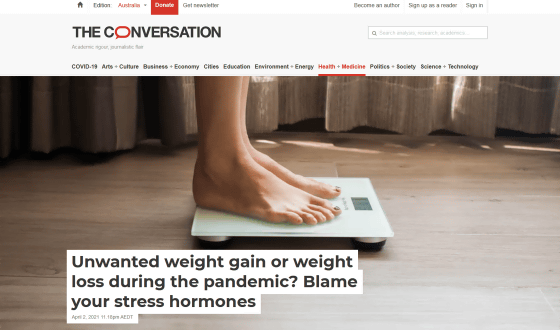What causes a sudden change in weight due to corona sickness?

The pandemic of the new coronavirus infection (COVID-19) is affecting the lives of many people, and many say that they have gained weight during the pandemic.
Unwanted weight gain or weight loss during the pandemic? Blame your stress hormones
https://theconversation.com/unwanted-weight-gain-or-weight-loss-during-the-pandemic-blame-your-stress-hormones-157852

According to a survey published by the American Psychological Association in March 2021, 61% of adults living in the United States since the outbreak of the pandemic said they had 'undesirable weight changes.' According to the survey results, 42% of the respondents reported an average weight gain of 29 pounds, while nearly 18% reported an average weight loss of 26 pounds. That thing.
Another study , published March 22, followed 269 subjects living in the United States from February to June 2020 to investigate weight changes during a pandemic. As a result, this study also found that subjects tended to continue to gain 1.5 pounds (about 680 g) per month on average.
Beggdache, who investigates the relationships between diet, lifestyle, stress, anxiety, and depression, cites 'stress' as a common feature of people who experience weight changes during a pandemic. As of April 6, 2021, the number of deaths due to COVID-19 has exceeded550,000, which is the highest in the world, and according to a survey conducted by the American Psychological Association in January 2021, about 84 adults living in the United States % Said, 'I have experienced emotions that lead to long-term stress such as anxiety, sadness, and anger in the last two weeks.'

Begdache points out that stress affects unwanted weight gain and loss because of the '
When fighting, fleeing, or reacting, levels of hormones and brain chemicals such as serotonin , dopamine , and melatonin decrease to reduce unnecessary behavior that can occur when coping with stress. Serotonin regulates emotions, appetite, and digestion, so a decrease in serotonin can increase anxiety and change your diet. Dopamine also regulates goal motivation, so reduced dopamine reduces motivation for exercise, maintaining a healthy lifestyle, and performing daily tasks. Melatonin is a type of hormone that promotes sleep, and when the amount of secretion decreases, the sleep cycle is disturbed, and when the secretion of these hormones decreases, the lifestyle changes significantly.
In addition, adrenaline and noradrenaline, which are secreted by fight-or-flight or reaction, can mediate physiological changes in stress, causing mood swings, dietary changes, and reduced goal-oriented motivation. That thing. In this way, when a person feels stressed and fights or escapes or a reaction is triggered, hormone secretion is disturbed, and it becomes easy to upset a healthy lifestyle and dietary balance, Begdache points out.

Weight gain caused by stress during a pandemic is thought to be primarily due to overeating high-calorie foods. Eating high-calorie sweets increases the amount of serotonin secreted in the short term, and you can feel happy. However, the feeling of happiness caused by eating sweets is temporary, and people soon fall into a cycle of eating new sweets and trying to get happiness, and as a result, they gain weight. ..
Also, food digestion in humans is regulated through the vagus nerve , which reaches the abdomen from the brain, but when stressed, the brain suppresses signals passing through the vagus nerve, slowing the digestive process. Some people may have experienced weight loss as this makes people feel full.
'The pandemic was boring because many people were trapped in their homes. The homes were less distracting, but they had a lot of food. Adding stressors to this scenario would be desirable,' said Begdache. It's an optimal situation where there is no weight change. ' Although stress is inherent in daily life, he said that stress reactions and undesired consequences can be prevented by using 'self-talk' that improves one's mental state.
Related Posts:







